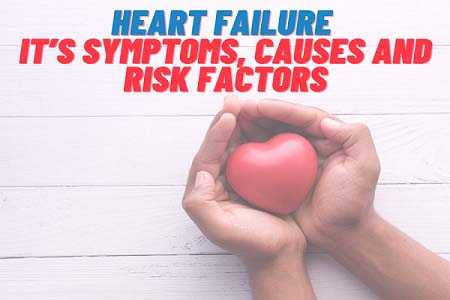Heart failure occurs when the heart is unable to pump enough blood and oxygen to sustain the body’s other organs. While heart failure is a serious disease, it does not necessarily imply that the heart has stopped beating. Heart failure, despite its severity, is not a death sentence, and recovery options are now more advanced than ever.
Blood and fluid may back up into the lungs (congestive heart failure), and certain areas of the body may not receive enough oxygen-rich blood to function normally. Heart failure signs are caused by these issues.
Heart failure occurs when the heart muscle weakens or loses the capacity to pump blood normally. The Ejection Fraction (EF) is a percentage that indicates how tightly the heart contracts (normal is 55-70 percent). You have heart failure with a decreased ejection fraction (EF 40%) if your heart isn’t “squeezing” well enough to get enough blood to your body. Heart failure with retained ejection fraction (EF > 50%) occurs when the heart cannot “relax” sufficiently to fill with enough blood between contractions. Cardiomyopathy, which simply means “heart muscle disease,” refers to the weakness and damage of the heart muscle.
Symptoms of heart failure:
The kidneys’ usual function of removing excess sodium and waste products from the body is hampered by heart failure. The body maintains more fluid in congestive heart failure, but not all heart failure patients maintain fluid. The following are the signs and symptoms of heart failure:
- Breathing problems during everyday tasks.
- When lying down or resting, you experience shortness of breath.
- Swelling in the feet, thighs, ankles, or stomach can cause weight gain.
- Feeling tired or sluggish in general.
Causes of Heart failure:
Other disorders, such as atherosclerosis or Coronary Artery Disease (CAD), heart attack, high blood pressure, heart valve complications, anatomy, and alcohol or substance misuse, are the most common causes of heart failure. Damage may also occur for no apparent cause. This is known as idiopathic cardiomyopathy (meaning “no known cause”), and many people with it discover that heart disease runs in their families.
Risk Factors of Heart failure:
Undiagnosed or untreated medical conditions raise the risk of developing heart failure over time. The following are a few of these ailments:
- Heart attacks and coronary heart disease (the most common form of heart disease)
- Blood pressure that is too high
- Diabetes
- Obesity
Unhealthy habits may raise your risk of heart failure, especially if you have one of the diseases mentioned above. The following are examples of unhealthy behaviours:
- Tobacco consumption or smoking
- Illegal substance use, such as methamphetamines, or heavy alcohol consumption
- Consuming high-fat, high-cholesterol, and high-sodium food
- Lacking sufficient physical activity
Dr. Rahul Kaiche one of the best cardiac surgeon in Nashik has performed multiple successful bypass surgery, advises his patients to not indulge in unhealthy habit but live an active and healthy life.


